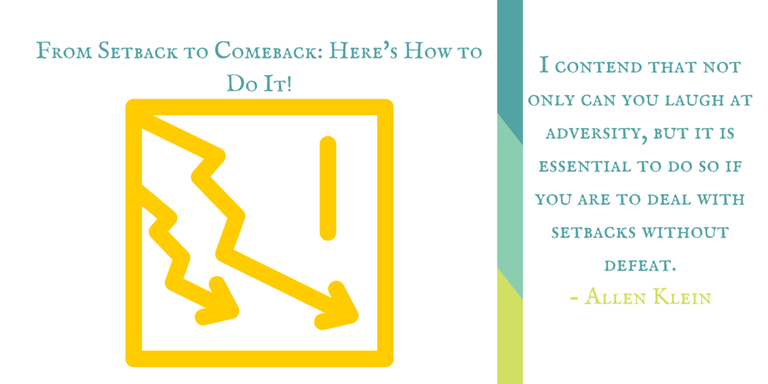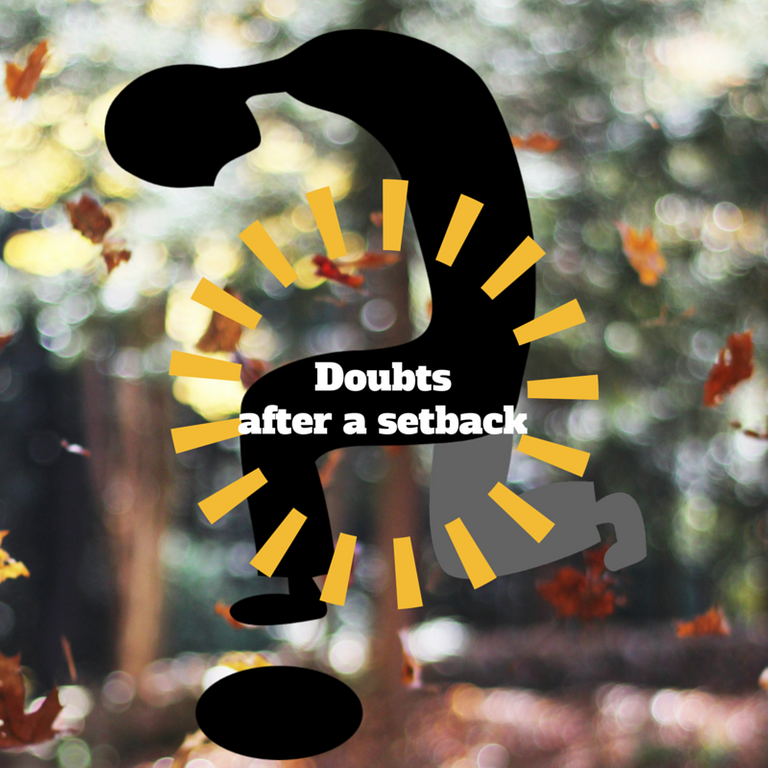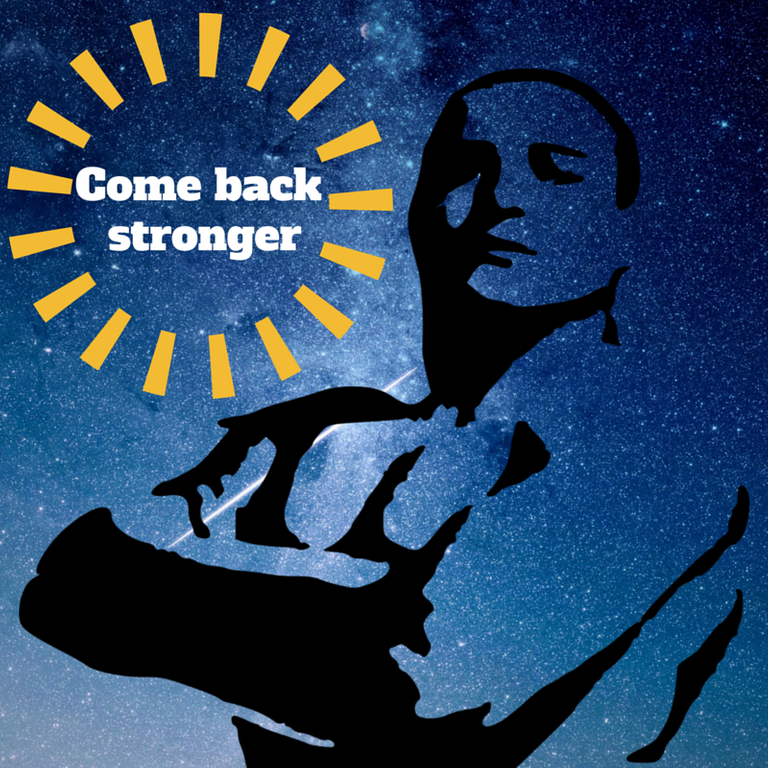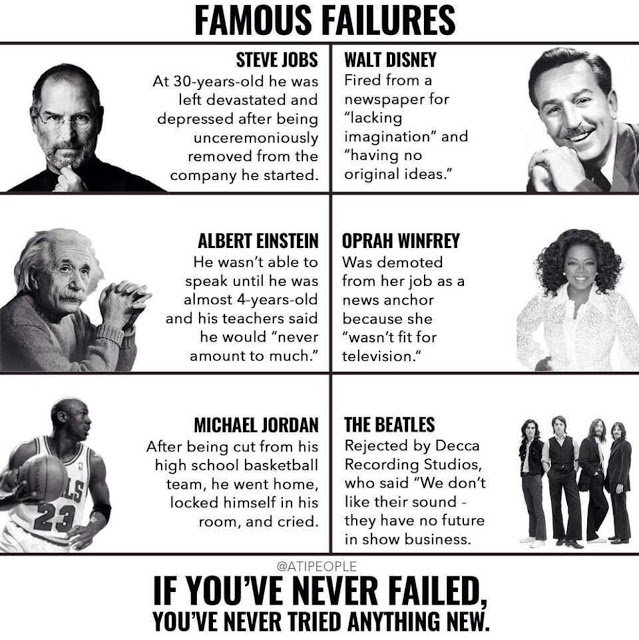
Why Setbacks Hurt

1. The ideal didn’t materialize
When we embark on a new undertaking, we visualize the ideal outcome. These expectations often turn out to be misplaced. People we deal with are unpredictable, or we may not be as disciplined as we thought we were when we started. This disillusionment can be really discouraging. In one way or the other, every time you have a setback you say this to yourself: “My life isn’t what I’d hoped it would be, and that sucks!”
2. Self-doubt creeps in
Even the most confident of people experience self-doubt after a setback. We are not machines, we wonder if the path we are following is worth all the effort. You wonder if life would be easier if you just quit.
3. Helplessness becomes you
The worst part of any setback is the helplessness you feel. You want to have things under control. Having everything fit nice and tidy in your life gives you confidence. Having setbacks takes that away from you.
4. Self-pity is crushing you
Right now, when you are disappointed, self-pity is your worst enemy. The weird thing about self-pity is that it is masochist in nature. You are actually, proactively, engaging in something that make you feel bad.
In other words, don't expect to always be great. Disappointments, failures and setbacks are a normal part of the lifecycle of a unit or a company and what the leader has to do is constantly be up and say 'we have a problem, let's go and get it'. – Colin Powell
Here's How to Come Back Stronger from Setbacks

1. Avoid ‘the shock’ by staying ahead of the game
Gilbert Brim once said: “sometimes we don’t know we are losing until the very end.” I love the Dutch culture where they tell it to you as it is, straightforward, no beating around the bush. Having lived in three different continents, I can confidently say that not many cultures share this characteristic. That is why there is a reluctance to deliver bad news.I admire the courageous person who comes up to me and tells me frankly that my ship is about to sink. If you do not have that kind of people around you (and even if you do), try evaluating the situation yourself. If all of a sudden you are not being invited to the meeting, your partner is hiding information from you, or your best friend is avoiding you; you need to know - as Donald Trump put it- “what the hell is going on!”. In doing so, you can stay ahead of the situation that is about to explode in your face and avoid the shock. It's the punches that we don't see coming that knock us out!
2. Don’t be too hard on yourself
You have probably seen the image below before. Take a minute and really have a look at it again. Forget everything else. You have everything it takes to do what these people did: mount an insane comeback. The best part is that you already know that.
3. Don’t blame, just learn
Life is a series of experiences, each one of which makes us bigger, even though sometimes it is hard to realize this. For the world was built to develop character, and we must learn that the setbacks and grieves which we endure help us in our marching onward. – Henry FordTake responsibility for your part of the failure but do not go overboard by blaming yourself. Life is unfair, perhaps someone treated you unfairly. Get over it so that it does not consume you. If you stay positive, you do not lose in life; you just learn and get stronger.
(a) Be open to feed back
There is nothing more powerful in your step forward towards learning and recovering than good feedback. Getting feedback from people directly involved in the situation will help you asses and analyse what went wrong and how to avoid the same in the future.(b) Learn about your alternatives
Many a time we condition ourselves into believing that our set of skills and experience confine us to do certain jobs and that’s it. We fail to see the enormous opportunities that are out there that may have nothing to do with the way we define ourselves. If you find something you love, you should go for it. At times of crises when you have nothing to lose, having a go is so uplifting.(c) Learn new skills
Become better than yesterday when the setback happened. Learning a new skill not only enhances who you are, but it also builds your confidence back by giving you a sense of achievement.The skills you acquire can always be effectively redeployed. You will look back on setbacks and be grateful for the catalyst that came not a moment too soon. – Tom Freston
4. Don’t be in a rush to bounce back
One of the greatest misconceptions today is that strong people bounce back from setbacks instantaneously. Now it’s true that you should not dwell over spilt milk but it does not mean you should rush things. There is a difference between a quick recovery and a hurried recovery process. Enjoy the many blessings in life while you plan your next move. Trust me, you are better off than jumping straight back into a vicious circle.5. Redefine what makes you happy
If you really sit down and count how many wonderful things are in your life, you realize that you do not actually need to get everything you set out for. I am by no means saying that you should not be disappointed when you don’t succeed in your endeavour. Of course you should. You put your blood, sweat, and tears into it. But remember, happiness has nothing to do with winning or losing. Look around you and be thankful of what you have already. This will make you even stronger on your way back to recovery. Find gratitude in the present moment because as someone once said “life is what‘s happening to you while you are busy making other plans”.Final Note
We all hit that bump in the road sometimes. Hell, sometimes the setback feels more like a brick wall. Make your recovery a fantastic journey by following the advice mentioned in this article. Do not spin out of control; do not despair! Grab a hold of that wheel and steer yourself straight!Source:
